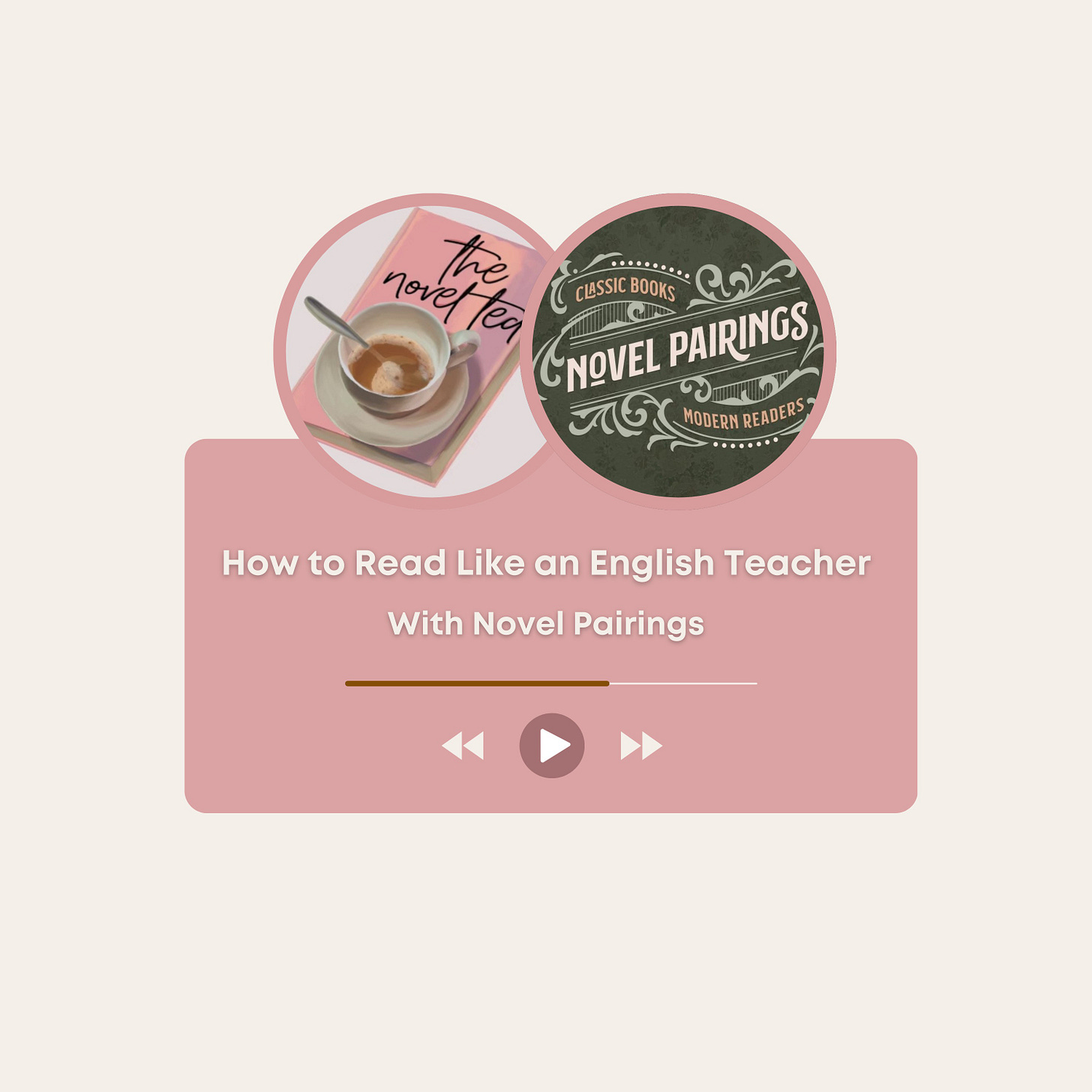Fantasy, Science Fiction, and Other Literary Worlds
Exploring speculative fiction, our book list for Season 3, and diversity in genre fiction
We’re back! We hope you have had a serene, restful winter, and a chance to read some of those books on your TBR. If you’ve heard our latest podcast episode, you’ll know that we just announced our theme for Season 3: Other Worlds. After a difficult end to 2023, with lots going on in the world, we felt that we needed an escape. So for the next few months, we will be reading about gothic atmospheres, mythical characters, beasts, wizards, ghosts, aliens, and all things supernatural.
If you haven’t guessed by now - all of these works fall into the broad umbrella of speculative fiction.
What is Speculative Fiction?
Speculative fiction, in short, is a blanket term for fiction that includes any genre that departs from reality. Where general fiction usually encompasses fictitious characters dealing with real-life issues, speculative fiction is a space where the imaginary world allows the characters to explore themes such as time travel, magic, supernatural beasts, or post-apocalyptic disasters.
Before we dive into speculative fiction, I wanted to take this opportunity to share Shruti’s personal writing - Shruti’s day job (and night job, and weekend job) entails being a surgeon, and recently she has started to write about her experiences.
I'm amazed at how Shruti puts everything into being a surgeon, podcaster, friend, reader, and writer. Not only does she go above and beyond for this newsletter, but now she also has her own, Brief Op Notes! Reading her work, I can see how all her skills amalgamate into this entertaining, thoughtful, and inspiring publication.
You can subscribe for free below:
Speculative Fiction versus Realistic Fiction
Readers are often siloed into different categories - these include “serious” literary fiction readers and sci-fi fantasy geeks. The two groups seem to have separate interests which can visually be seen in the difference of cover art between the two genres, the location of where they are placed in a bookstore or library, or the language used to describe them in book sleeve summaries.
Why is there a perception that literary or realistic fiction and speculative fiction are two opposite sides of the genre spectrum?
The culprit: the publishing industry. Publishers needed a way to differentiate genres for marketing purposes and target a specific demographic. This has created a divide and polarized readers. But when we examine dystopian stories like The Handmaid’s Tale by Margaret Atwood, or fantasy quests like The Game of Thrones by George R. R. Martin it becomes apparent that this division isn’t as clear as it might seem at first glance.
When we look a bit closer, we can see that while speculative fiction might be more “unrealistic” it is in fact very real in its commentary about the world around us. The Giver, as dystopian fiction, is pointing out the flaws in our current society, and the dangers of not paying attention to certain populations. Frankenstein, perhaps the first modern science fiction novel, explores ideas of science, creation, and our limitations as a species. Speculative fiction and realistic fiction are both addressing the same ideas - they just use different tools to do so.
New and Unique Genres of Speculative Fiction
Speculative fiction has been around for thousands of years. Though the term didn’t exist then, stories such as Shakespeare’s A Midsummer Night’s Dream or ancient Greek texts can also be considered speculative fiction. Since the term was first coined in 1947 by Robert Heinlein, the definition has evolved and expanded into the many sub-genres it encompasses today.
What is interesting is that speculative fiction is still expanding. Leave it up to us humans to keep the creativity going and generate new genres for future generations to discover and enjoy. The Alternative came up with this list of up-and-coming speculative fiction genres.
Solar Punk: We all know the genre of cyberpunk. A juxtaposition of futuristic mechanisms with a dystopian society, Cyberpunk can generally be defined as a commentary on the negative connotations of the future. Solar punk is a positive response to this classic genre by introducing ultramodern development in a utopian setting instead.
Afrofuturism: Though the movement of Afrofuturism has been going on for decades, it has been drawn into greater focus lately as its own genre in books and movies in the 21st century. It can be defined as “speculative fiction that treats African-American themes and addresses African-American concerns in the context of 20th-century technoculture,” See more here.
Cli-Fi: As global warming and climate changes encompass our day-to-day life increasingly, the new genre of Cli-Fi makes itself present. The term was coined by Dan Bloom in 2010 in an effort to make readers more conscious of what’s at stake as the world around us changes.
This article by How We Get To Next explores these new microgenres and more with book and author recommendations under each category.
Our Season 3 Books and Why We Picked Them
In previous seasons, Shruti and I have tried to focus our reading efforts on collecting and exploring diverse stories by diverse authors. One of our missions with our podcast is to discover modern classics that aren’t necessarily written by male or white-centric storytellers. If you listened to our Season 3 Intro episode, you might be questioning just how diverse our book picks are. Speculative fiction is a genre that has been dominated by white men, so picking our book list for this season was a difficult journey.
On the surface, it doesn’t seem like a hard task to Google search “What are speculative fiction books by diverse or female authors?” This list will give you authors like Octavia E. Butler, Margaret Atwood, and Ursula K. Le Guin, whom we will all be covering this season! On the other hand, reading speculative fiction by white male authors with our mission in mind may provide us with different insights on cultural perspectives or worldviews. Discussing their works could foster conversations about the genre’s evolution. Some of the books we are reading this season date back 20-30 years, and some are more recently published in the last 2-3 years. With all of this in mind, in addition to our personal reading preferences, our Season 3 book picks are listed below. For more information on these books, and specifics on why we picked them, make sure to tune in to the full episode.
What I Am Hoping to Get Out of Season 3
If a speculative world is a world where anyone can be anything, then when I hear the word “elf” why do I either picture young Orlando Bloom with long blonde hair and a bow and arrow, or Will Ferrell in a silly green suit screaming “Santa!” In the same way, when you picture a hobbit from Lord of the Rings or The Hobbit, it’s hard not to imagine some version of Elijah Wood with hairy feet in your head. But did you know that Tolkien originally described the hobbits as having a dark brown skin tone?
Most fantasy lovers are very familiar with mythical creatures like trolls, fairies, or mermaids that all originated from European folklore. But have we seen mythical creatures such as the Gumiho, a thousand-year-old nine-tailed fox spirit that originated in Korea? Or the seven-headed flying horse called Uchchaihshravas mentioned in the Mahabharata and Bhagavad Gita?
Surely, we can do better in an imaginary world, and that is one of the things I will be looking out for in this upcoming season. I am not implying that there are no examples of diversity in speculative fiction (throwback to Nasuada, one of the most bad-ass characters in the Inheritance series when I was growing up), but I am looking forward to reading descriptors of a vampire other than “pale” or “white as a sheet” in Fledgling by Octavia E. Butler. Ursula K. Le Guin has written several speculative fiction books encompassing people of color, commentary on the patriarchy, and the society we currently live in, and I am excited to discover her works, as well.
There’s a whole new way we can appreciate speculative fiction that is inclusive and influential, and I am hoping that we can help bring those stories to light.
Quick Picks
In this section, we’ll share books, movies, podcasts, TV shows, and other arts/media we have been enjoying lately. Today’s selections highlight different aspects of speculative fiction.
VIDEO GAMES | VALORANT: It’s surprising to think that most of my after-work activities include something related to speculative fiction, and Valorant has been my most recent obsession. Valorant is a first-person shooter game where your character is set on a near-future Earth with unimaginable technological advances, the introduction of a phenomenon called The First Light, and a mysterious substance called radianite. It’s been a fun activity for me to spend time with friends or family who don’t live in the same city as I do.
You can download this game for free on Riot Games.
MOVIE | THE BOY AND THE HERON: If you haven’t dabbled in any of Hayao Miyazaki’s films in your life yet, and you have a blossoming interest in speculative fiction… I have to recommend his movies. These ethereal narratives are filled with magic, important messages, and just pure joy. The Boy and the Heron is a magical and twisted story about a young boy and how he deals with the grief of losing his mother. It won a Golden Globe for Best Animated Movie in 2023, so you know it’s not just my biased opinion talking.
The Boy and the Heron is now playing in theaters.MUSIC | DISCOVERY BY DAFT PUNK: Though this isn’t a recent obsession, Daft Punk released a visual companion to their Discovery album back in 2003. This series of animated science fiction music videos called Interstella 5555 tells a story of the abduction and rescue of an extraterrestrial pop band with essentially no audio dialogue except the music from the album. It’s filled with nostalgic melodies, enchanting artwork, and a storyline that will pull at your heartstrings.
You can stream these music videos on YouTube.
— Neha
Up Next
Tomorrow we will be releasing a special bonus episode: How to Read Like an English Teacher with Sara and Chelsey of Novel Pairings. We had so much fun talking with them about classic literature, analytical reading, our favorite books, and more! Subscribe wherever you get your podcasts to listen in.
You can check out some of their past posts about speculative fiction, and subscribe to continue getting newsletters from them! Make sure to also follow them on Instagram and check out their bonus classes on Patreon.








